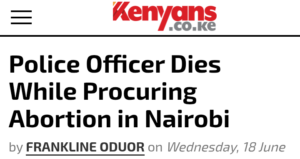A female police officer from the Rapid Deployment Unit has died in Nairobi in a case that is suspected to involve an abortion gone wrong.
The officer, who was on leave from her work station in Embakasi, was first taken to a hospital in Kawangware after being transferred from another clinic. She was already unconscious by the time she was brought in. Unfortunately, she did not make it alive to the hospital ward. A doctor who received her after she arrived in a private car confirmed that she was already dead and that there was no need for admission.
Reports from both the doctor and police suggest that the officer might have been induced into labour at the earlier health facility she visited. It is believed that this caused her to start bleeding heavily, and that bleeding eventually led to her death.

Source/Kenyans.co.ke
Her body was then moved to a mortuary, and an autopsy is expected to confirm the exact cause of death. The incident happened in the Kabiru area of Kawangware.
Following her death, a nurse who was on duty at the clinic and a driver working for the facility were arrested by police on Wednesday.
They are now being questioned as part of the investigation into what really happened and who may be responsible.
The situation has once again brought attention to the risks associated with unsafe abortions in Kenya, even among educated and employed women.
Recent data from reproductive health organisations shows that there were an estimated 792,694 induced abortions in Kenya in 2023 alone.
This equals a national rate of 57.3 abortions for every 1,000 women between the ages of 15 and 49. The statistics have revealed that a large number of these cases involve married women almost 80 per cent proving that abortion is not just a problem affecting teenagers or unmarried girls as many often assume.
Regions like Nairobi and Central Kenya have the highest numbers, with an average of 78.3 abortions per 1,000 women. On the other hand, areas like the Coast and North Eastern Kenya have much lower rates, with about 38.7 per 1,000 women.
Despite more people knowing about safe abortion drugs like misoprostol, which was used in 89 per cent of reported cases, many women still lack access to quality care when things go wrong.
A major concern raised by experts is that only 18 per cent of smaller health centres across the country are properly prepared to handle emergencies that come after abortions.
This means that many women who experience complications may not get the help they need in time.
The death of the policewoman highlights how serious this gap in care really is and why it needs urgent attention.



